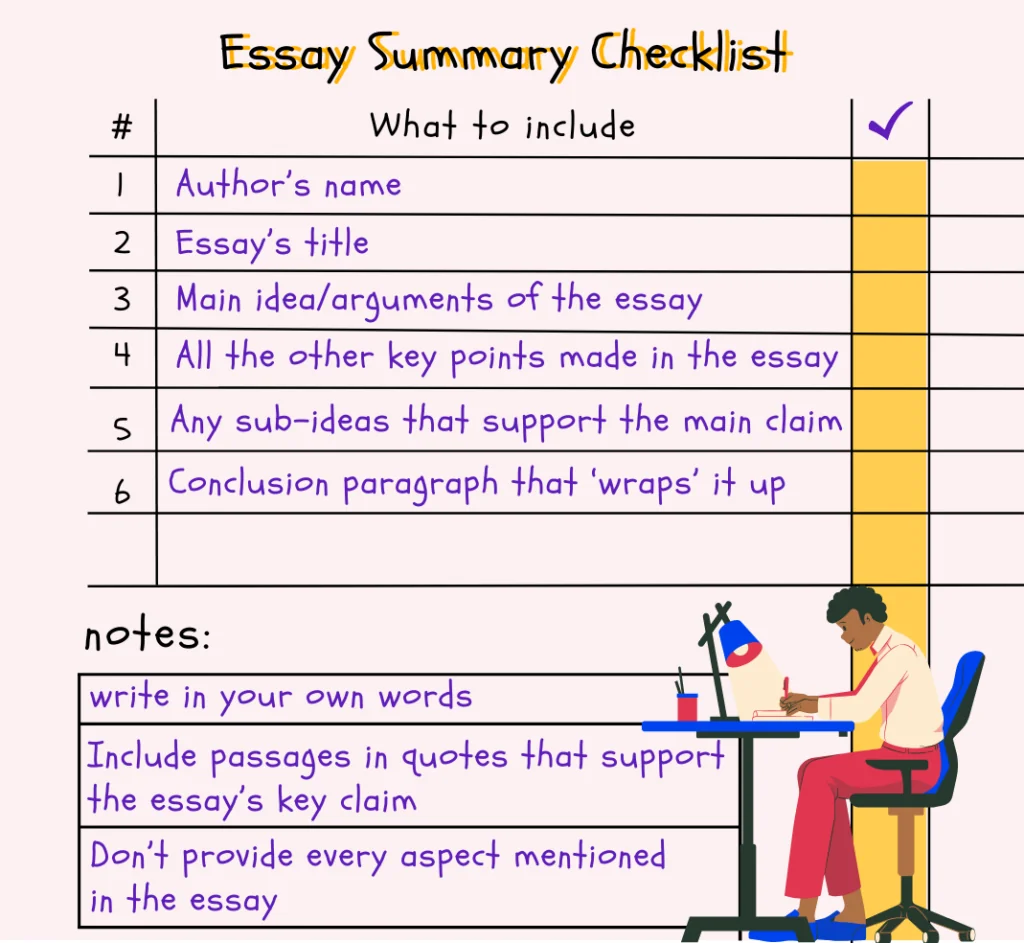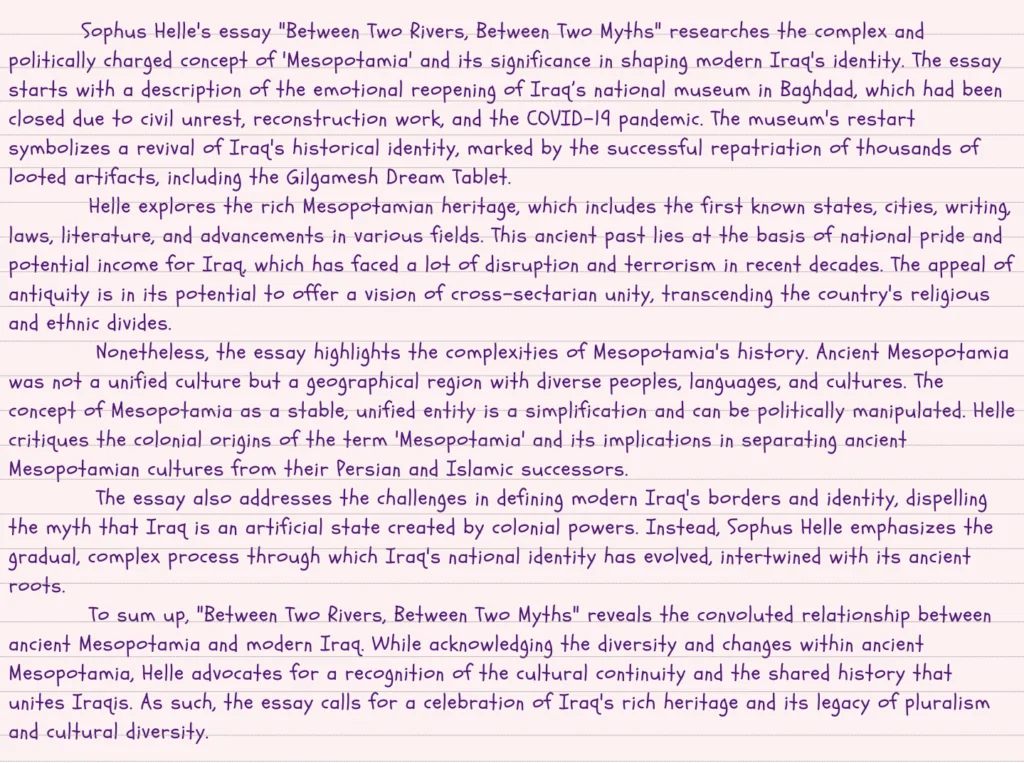College and high school students (as well as maybe some middle schoolers) will often face the task of summarizing a book, article, video, or anything they’ve seen/read. Sometimes, you will have to create summaries for yourself, so that you understand the material better. Other times though, you will have to write summary essays, the main purpose of which is to give others an overview of the original source. In both cases, summaries look somewhat the same: they are concise, contain only the most crucial points, and pass on the key idea or essence of the initial material, be it a movie or a book. To serve that purpose, summaries need to be well-written and we will show you exactly how to summarize an essay in the most effective format.

✅ AI Essay Writer ✅ AI Detector ✅ Plagchecker ✅ Paraphraser
✅ Summarizer ✅ Citation Generator
The Key Parts of a Summary: Structure
As a student, you know that most writing tasks have guidelines. You also most probably know that, if you are asked to write a certain type of writing, it has a specific structure and format. See, that’s why you can’t write summaries at random too.
Thus, before starting the writing process, let’s first figure out what structure this type of writing has. This will allow you to create a summary essay outline that will make it easy for you to include all the essential information and will guide you throughout the writing process as well.
Here’s what you absolutely have to include in your essay summary:
- Introduction + thesis, which will provide readers with all the necessary details about the work (title, author, etc) and its key idea
- Body paragraphs that support the main point of the essay and therefore include all the necessary details that show how the author justifies their claims
- Conclusion paragraph, which is usually one sentence that may rephrase the main idea and which is called to tie everything together.
You can use our checklist below to help you track down whether you included all the necessary components:

Writing a Summary Essay: Detailed Guide
Before jumping straight to writing, let’s see what we now know about these special summaries:
- What is a summary essay? – Check✅ It’s a concise overview of the essay you’ve read that communicates the key ideas of the material.
- What parts does a summary essay have? – Another check✅ Introduction, with details about the essay + thesis statement; body, with the summary of the main points; conclusion, which wraps up the key idea of the essay.
- How to write a Summary? – ⚠️This one we will break down further in this paragraph.
One would think that the guide to writing a summary couldn’t be that complex: just read the text, sit down, and write. However, if you scroll through the writing guide below, you will see that there are nuances.
Read & Study
First things first, get to know what the essay is about. Read through it carefully. If it helps you, take notes as you read, marking the most important arguments and ideas that need mentioning in your essay. A good thing is you can get a feeling for the author’s style, tone, and mood, and try to identify the main claims they made.
Divide & Outline
After you are done reading, break down the essay into several sections. Breaking the text into several parts will make the material easier to grasp. With their help, you can also create a rough outline of what your summary will look like.
Identify Key Ideas
Read each part you divided the essay into once more. This time, highlight some of the key points. Mark areas you want to refer to in your summary, as well as those that shouldn’t be included in your essay. If you are struggling with this part of the process, you can try using an AI summary generator for some help. During this stage, you should also be able to identify the general message and the essence of the essay.
Create an Introduction
You now have all the necessary details to be able to begin summarizing. Start with an introduction with an opening line that includes the name of the author and the title of their essay. Follow that information with a rather broad overview of the content of the work you will be summarizing. Sometimes, if it is important to understand the essay, you may present here the author’s background as well. And don’t forget the thesis statement that transmits the purpose/point of the work.
Move on to the Body
In the main body paragraphs, state the ideas you’ve chosen while reading the text. Expand on them by including one or more examples from the original text. Don’t forget to include citations if you do that. Our citation generator can give a hand with that.
Quick Citations for Your Convenience
Also, in this part, you can mention any supportive points given in the original text. These could be examples, or stories (but brief or rephrased) that the author originally mentioned.
Finish with a Conclusion & References
Phew, we are at the finish line now. All that is left is to write a concluding paragraph, which is usually around 2-3 sentences tops. Here you need to basically rewrite the thesis statement, once again emphasizing the main purpose or claim of the original source. After that, don’t forget to include a properly formatted reference of the original source to acknowledge the writer. It is not always a requirement but it is especially needed if you include quotes in the text of your summary.
Review & Proofread
Okay, the hardest part is left behind. You can now read through what you’ve written. Make sure everything sounds logical and clear. Pay attention to grammatical and punctuation mistakes. Try reading it aloud or giving it to somebody else to read it for you. This will help you pinpoint places that need improvement and maybe throughout 1 or 2 unnecessary details.
Dos and Don’ts of Summary Essay Writing
Look at you, knowing all this about writing an essay summary. Good for you! And what’s more, you can basically complete any type of summary now, just switching up its content. However, we are not done with teaching you yet. We got the basics settled, so now it’s time to get to the advanced stuff. These are the dos and don’ts that will serve as boosters for your writing. Keeping these tips in mind will help you craft your summaries more quickly and will largely reduce the proofreading time.
| DO this when writing your essay summary | DON’T DO this when writing your essay summary |
|---|---|
| Use your own words and cite the author’s words if you use them | Go into excessive detail regarding the content of the essay |
| Write in the present tense even if the author’s narrative was in the past. | Include your personal opinion on the essay you’ve read |
| Include citations that are word-for-word written as the original writer said them | Use examples, illustrations, or personal stories to support the main idea of the essay, besides those mentioned in the text itself |
| Cite passages first signaling the quotes with the author’s name as well as the work’s title: Kelsey in “My Little Autobiography” specifically mentions “passage” (para. 6) | Try to grasp all of the ideas contained in the original text in your essay. Focus only on the most important points. |
| Be objective, excluding your ideas, assumptions, judgments, or comments from the summary | Insert lengthy passages or quotes from the original material |
| Revise the summary after you’ve written it. It’s also a good idea to give your essay to a friend or a colleague to read to see if they can grasp the main idea of the source after reading your summary essay. | Forget to include transitions to signal when you move to a new idea within the same paragraph. |
| Include references at the end of the summary that include the citation for the original text |
Essay Summary Example for Inspiration
Here’s a simple example of a summary of an essay that can serve as a sample and inspiration for your work:

FAQ
Follow us on Reddit for more insights and updates.
Comments (2)
Welcome to A*Help comments!
We’re all about debate and discussion at A*Help.
We value the diverse opinions of users, so you may find points of view that you don’t agree with. And that’s cool. However, there are certain things we’re not OK with: attempts to manipulate our data in any way, for example, or the posting of discriminative, offensive, hateful, or disparaging material.




In that, do we need to support the main idea?
yes